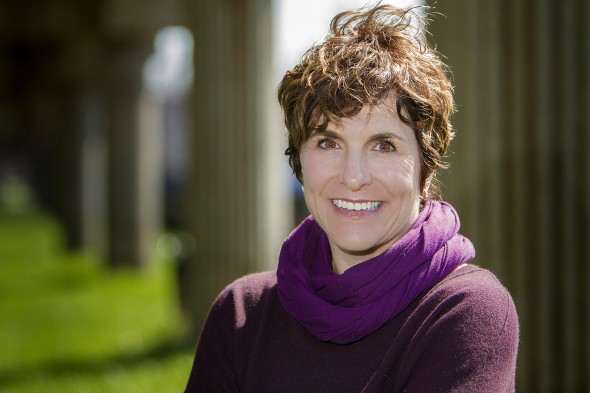Why are e-cigs so popular?

E-cigarettes are rising in popularity among youths. “They’re novel, interesting and a little bit rebellious,” says researcher Sherry Emery. Photo: Jason Beaumont
A young man lifts a metal tube to his lips, inhales and then expels a surprisingly large white cloud of smoke.
It looks like smoking, but he’s “vaping” — breathing in tobacco-less water vapor — via an electronic cigarette.
It’s an increasingly common sight as the devices become more popular. One out of 10 high school students used e-cigs in 2012, along with nearly 3 percent of middle school students, according to a new federal report.
How to explain this popularity?
Sherry Emery, a senior research scientist in the Institute for Health Research and Policy, says it’s a combination of many things.
“For kids, they’re novel, interesting and a little bit rebellious,” she said. “Compared to regular smoking, it’s just different.”
E-cig users argue that they’re less harmful to one’s health than cigarettes.
Is vaping unhealthy? “The stuff used to heat the liquid contains heavy metals,” Emery said.
Advertising is another factor, both mass marketing by outlets like Costco and 7-Eleven and word of mouth.
“At mom-and-pop vape shops, they sell customizable devices that can heat [the contents] at different temperatures,” said Emery, who has never smoked. “There’s a craft aspect to it.”
Gateway to smoking tobacco?
Whether e-cigarettes are a gateway to smoking tobacco is subject to debate. “I think it’s likely,” Emery said. “Some public health researchers say they renormalize the act of smoking. We need another two to three years of research.”
Smokers too young to buy cigarettes — under 18 in Illinois — can easily buy e-cigs online. The devices are odorless. “Never smell like an ashtray again!” crows one website. And vape shops lure e-cig smokers with contests — seeing who can blow the most elaborate plumes, biggest smoke rings or biggest cloud. “There’s a lot of money for winners,” Emery said.
Smokers can use e-cigs to deliver marijuana, methamphetamines and cocaine — “whatever you put in them,” she said.
Proof of the devices’ popularity is that the tobacco industry is lobbying the FDA for their regulation. “I think that is not unreasonable,” Emergy said. “There are no product standards or purity standards.”
E-cigs come in a number of sizes. “Some look like ordinary cigarettes,” she said. “A big brand is Blu — it looks like a regular cigarette, but the end lights up blue.”
Emery is director of the Health Media Collaboratory in the Institute for Health Research and Policy. The group of more than 20 researchers, funded by the National Institutes of Health, studies interaction between the news media and health behavior.
Emery grew up in Wheat Ridge, Colorado. She earned a bachelor’s degree in economics from Johns Hopkins University, an MBA from Columbia University and a Ph.D. in regional planning from the University of North Carolina.
She taught for four years at the University of California at San Diego before joining UIC in 2001.
Emery, who is divorced, lives in Hyde Park with her son, Max, 13, and 11-year-old twin daughters, Zoe and Leila.
As to her role in regards to tobacco and other products, she said, “I’m not much of an activist or advocate. I’m really in it for the science.
“That said, one thing I always tell my students is that good research — data — can level the playing field with these deep-pocketed industries that have seemingly unlimited resources to throw at both lobbying and marketing, in their efforts to promote their products.
“Solid, policy-relevant findings can tip the balance — and did with tobacco.”
When she was just getting started 15 years ago, the idea of the FDA regulating tobacco was a pipe dream, she said.
“Now, it’s a reality that is rolling out slowly, but research laid the foundations for current policies and promises to be incorporated into the development of new policies.
“The same is true with sugar-sweetened beverages (pop). I expect it will be true as we see what happens with the sweeping changes in marijuana policy, too.”
